 Iran’s Attack on Israel
Iran’s Attack on Israel
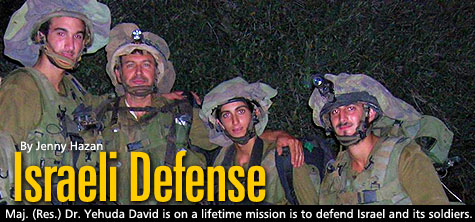

9 min read
Maj. (Res.) Dr. Yehuda David is on a lifetime mission to defend Israel and its soldiers.
When the Second Lebanon War broke out in July, 2006, Dr. Yehuda David was in Greece on vacation with his wife and three kids. As soon as he heard the news, the 57-year-old senior orthopedic micro-surgeon at Tel Hashomer Hospital got on the first flight back to Israel. By the time he arrived, the IDF paratroopers unit for which he had volunteered as a reservist medic each year since 1995 was already deep inside enemy lines. Maj. (Res.) Dr. David was reassigned to a new unit, the Nachal Brigade Granite Battalion 932, which ended up in Lebanon for most of the 34-day war, fighting in some of the war’s most intense battles – at Mis el Jabel, Kantara, and Randoria.
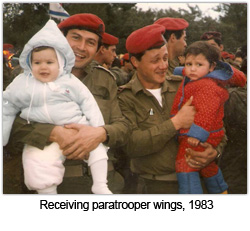 “It was very difficult,” says David, who first joined the IDF in 1983 after making aliyah from Paris, France in 1981. He fought in Lebanon in 1993, in Operation Defensive Shield in 2002, and 1979-81 for Israel as a soldier in the French army, as part of their aid to developing countries. But no battle, he said, was as tough as the Second Lebanon War.
“It was very difficult,” says David, who first joined the IDF in 1983 after making aliyah from Paris, France in 1981. He fought in Lebanon in 1993, in Operation Defensive Shield in 2002, and 1979-81 for Israel as a soldier in the French army, as part of their aid to developing countries. But no battle, he said, was as tough as the Second Lebanon War.
"No battle was as tough as the Second Lebanon War."
“It was a victory of each foot, each meter of each soldier, step by step, room by room, kilometer by kilometer of raging battle,” says David, explaining that the Hezbollah fighters were hidden in tunnels, while the IDF soldiers, in plain view, were charged with finding them. “It was very difficult to conquer each and every village. After six years of Intifada, the soldiers weren’t used to this type of battle.”
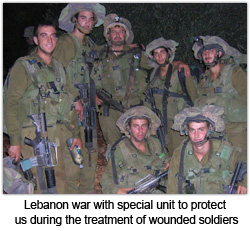 For David himself it was particularly challenging since he was on the front lines, performing operations in the battlefield side-by-side with the Nachal fighters. “I had to run with my soldiers, at the same pace with all my medical equipment. I am nothing without it. It’s my hospital. It was very, very difficult.”
For David himself it was particularly challenging since he was on the front lines, performing operations in the battlefield side-by-side with the Nachal fighters. “I had to run with my soldiers, at the same pace with all my medical equipment. I am nothing without it. It’s my hospital. It was very, very difficult.”
The toughest point was the battle at Randoria, near the end of the war. When Battalion 932 arrived to the village, they were disheartened to see what had happened to the unit before them. They had been ambushed and the streets were scattered with dead and badly wounded. Their medic was severely wounded and unable to help the others.
As the Hezbollah bombs and bullets fell around them, Battalion 932 Commander Ran Kahane gave the order to the soldiers to drop their equipment, each pack of supplies weighing 40-50 kilos, to allow the soldiers to run and take the village from the opposite entrance, a few mountainous and sandy kilometers away.
In the end, the maneuver was a success and they wiped out all the Hezbollah fighters, room by room, in a battle that lasted more than eight hours. As the battle raged, Dr. David went in to help the fallen soldiers from the ambushed unit. He and his young colleague, a first-time battlefield medic, treated and evacuated 120 wounded.
None of the soldiers from Battalion 932 were injured in the battle. “We felt God's protection hovering over us,” says David. “Thank God no one was hurt.”
More Miracles
For David, this was the first of several miracles. After the battle ended, the soldiers, exhausted, found themselves without supplies. Most of the food, water, technical equipment, and ammunition that they had left at the entrance to the village had been destroyed by heavy shelling. The most urgent need was water.
David spotted two jerry cans of water between two houses. Was it laced with cyanide?
David spotted two jerry cans of water between two houses. The question was to drink or not to drink? David had heard from a colleague of his who served in the Yom Kippur War of an Arab battle technique to leave out water poisoned with cyanide. The substance, which smells of bitter almonds, is extremely dangerous even to inhale. David poured a bit of the water into a cup, and while he debated whether or not to drink it, a small dog came out of nowhere, lapped up the water that had fallen to the ground and walked away, unharmed. “That water," David says, "gave us a lease on life for another five days, until we were able to receive supplies.”
David recalls a third incident. In the midst of battle, to rehydrate and keep up their blood sugar levels, David entered a nearby pomegranate orchard several times to pick the fruit and throw it to the soldiers. As it turns out, the orchard was full of Hezbollah terrorists. “I went in some 20 or 30 times, and I still can’t figure out how I didn’t see them and they didn’t see me,” he says. Eventually, the terrorists made their presence known and they were wiped out by David's unit.
David also saw what he calls medical miracles on the battlefield. He shares the story of one Nachal soldier named Moshe, who was severely injured by a bomb. He suffered from several fractures and lacerations, including two to major arteries in his neck and right knee. David, who was 10 meters behind him when the bomb went off, resuscitated him and evacuated him to the nearest hospital. By the time he arrived on the operating table, he was almost without blood.
“Three months ago, he invited me to his wedding,” says David. “Everything we did in the battlefield saved his life.”
Beyond the Call of Duty
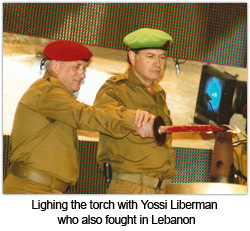 In 2007, David received two honors, a ‘tsallash’ Head of Regional Command (Aluf) Citation from the OC Central Command, and the ‘messuah lighting’ (lighting of the torches) during the state’s official Independence Day celebration for his actions in the Second Lebanon War. “These are great honors, and I hope it’s not the end, because if there are battles in the future, I’m sure I’ll ask for the honor of participating in them,” says David.
In 2007, David received two honors, a ‘tsallash’ Head of Regional Command (Aluf) Citation from the OC Central Command, and the ‘messuah lighting’ (lighting of the torches) during the state’s official Independence Day celebration for his actions in the Second Lebanon War. “These are great honors, and I hope it’s not the end, because if there are battles in the future, I’m sure I’ll ask for the honor of participating in them,” says David.
David has continued to volunteer for the last 15 y ears since he completed his IDF reserve duty obligations.
It’s not for the honor that he has continued to volunteer for the last 15 y ears since he completed his IDF reserve duty obligations, some years dedicating as much as 90 days to IDF service.
He does it for many reasons, but first and foremost he does it because his presence, as a surgeon with more than 20 years of experience, gives the young soldiers with whom he serves a great sense of security.
“I have a lot of experience and for the young soldiers who are fighting it's very reassuring to know that they have a good surgeon with them. They know that in case they get injured, they are immediately in very good hands.” says David, whose son will enter the IDF as paratroop commander next month. “These kids are giving everything. They are giving their lives. They must have maximum support from the medical corps.”
David’s presence gives parents peace of mind, as well. “I am always thinking about the mothers and fathers,” he says. “If it is possible for me to bring their sons back to them alive and in good health, then I think this is my mission.”
There are other reasons for his dedication to the IDF. As an immigrant to Israel from France, he has a unique perspective on the importance of Israel and its defense. “The next battle with Lebanon will be different. Hezbollah has a lot of striking force today. They can throw missiles into Tel Aviv,” he says. “But with God's help, we will win. We must win. There is no other choice.”
The Media War
David is also fighting for Israel off the battlefield. On February 8, 2011 he will appear at an international tribunal in Paris as a key witness in a case against French public television station France 2 over their coverage of the Jamal Al Dura story, a Palestinian who accused the IDF of killing his 12-year-old son Mohammad and shooting him in the arm, alleged events that helped provoke the Second Intifada in September, 2001.
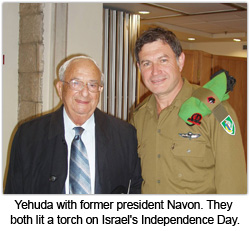 When the France 2 reporter published the photos of Al Dura’s injuries in 2005, David immediately recognized the scars, as they resulted from a rare surgery he had performed on Jamal Al Dura in 1994 to bring feeling back to his paralyzed hand after he was severely wounded in 1992 by an axe-wielding Palestinian thug.
When the France 2 reporter published the photos of Al Dura’s injuries in 2005, David immediately recognized the scars, as they resulted from a rare surgery he had performed on Jamal Al Dura in 1994 to bring feeling back to his paralyzed hand after he was severely wounded in 1992 by an axe-wielding Palestinian thug.
He had been treated unsuccessfully at Gaza’s Shifa Hospital and was sent to David’s department at Tel Hashomer. The procedure, which was successful, involved removing tendons from Al Dura’s left leg and inserting them into the injured right hand.
“The press images were from a medical file that I wrote,” says David. “His wounds are not bullet wounds, but were produced by two things – first, the knife of the Palestinian who cut him, and second, my knife that fixed his hand. He faked the case.”
As for the alleged murder of Al Dura’s son, who has become an icon of Palestinian martyrdom, David says that German documentary producer Esther Shapira has found compelling photographic evidence that he is still alive and that the boy who was buried in his name was not him, but another boy who died of completely unrelated causes.
“IDF soldiers do not fire on children. I am speaking as a soldier who was a number of times in these kinds of situations. Before the IDF shoots a suspected terrorist, they practically need the authorization of the Prime Minister, and they would never get authorization to fire on a child. It’s impossible,” says David. “It is of tremendous importance to me to show the Arab world that it was a lie.”
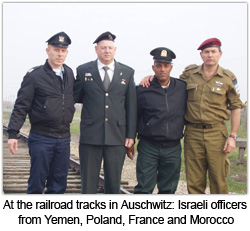 David is working on yet another avenue to help bolster the strength of the state of Israel – the political arena. After the Second Lebanon War, he decided to pursue an M.A. in Political Science at Tel Aviv University, with the intention of becoming active in Israel’s political life. “It is the real theater of action,” says David, who is aiming to get into the next Knesset. “I think I have what to contribute, and my French culture, my Israeli culture, and my experience could be a pull for many young immigrants. My life shows that there is hope in Israel and you can succeed to get to the top even if you are beginning from zero, as I began.”
David is working on yet another avenue to help bolster the strength of the state of Israel – the political arena. After the Second Lebanon War, he decided to pursue an M.A. in Political Science at Tel Aviv University, with the intention of becoming active in Israel’s political life. “It is the real theater of action,” says David, who is aiming to get into the next Knesset. “I think I have what to contribute, and my French culture, my Israeli culture, and my experience could be a pull for many young immigrants. My life shows that there is hope in Israel and you can succeed to get to the top even if you are beginning from zero, as I began.”
In the end, it’s all about defending and protecting Israel and securing the Jewish future. "Everything I do, everything I am, is in that service."
